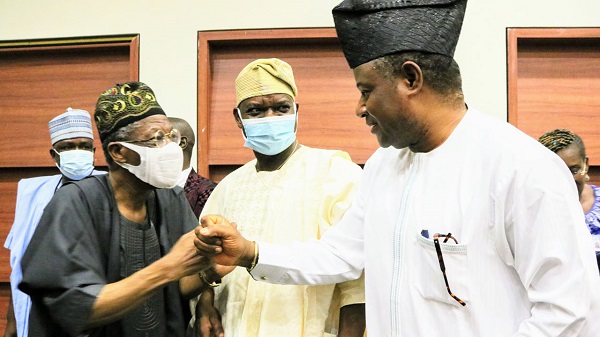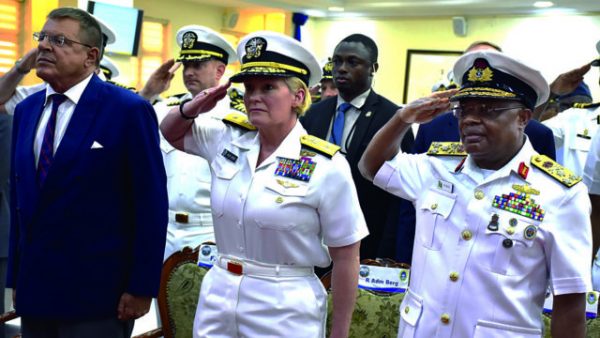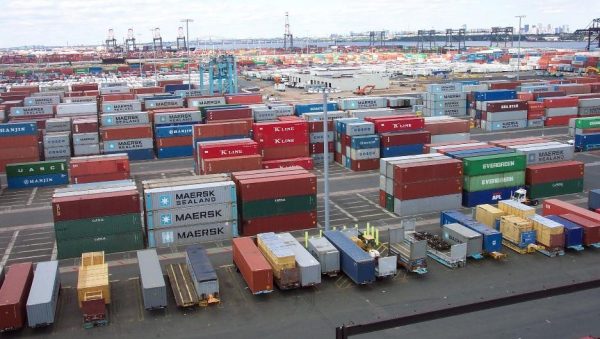Twitter’s Operation Illegal Despite ECOWAS Court Ruling, FG Insists

• Threatens to suspend Facebook, Instagram, Whatsapp, others
• Malami, Fashola, Mohammed lead FG’s delegation to engage Twitter
• Over N44b lost as digital, brand marketers decry continued suspension
• ECOWAS Court stops FG from prosecuting citizens for using app
• Respect court ruling on Twitter, HURIWA tells Buhari
• Buhari’s Rep: Social media not food, let’s go back to old ways of life
Eighteen days after the micro-blogging platform, Twitter, was suspended in Nigeria, the Federal Government insists operation of Twitter in the country’s social media space “is not legally permissible.”
The Minister of Information and Culture, Lai Mohammed, disclosed this yesterday when he appeared before a House of Representatives investigative hearing. He said Twitter was used to disseminate information “that endangers the life and security” of Nigerians and cause disunity in the country.
Following the suspension, the green chamber had mandated its committees on communication, justice, information and culture, and national security and intelligence to investigate the circumstances behind the decision.
Speaking at the investigative hearing, Mohammed said the Companies and Allied Matters Act 2020 does not permit foreign companies to do business in Nigeria if not registered. He said Twitter cannot be given the legitimate rights to operate until it is incorporated in Nigeria.
“As it regards operation of foreign companies in Nigeria, the law provides that a foreign company, which fails to take necessary steps to obtain incorporation as a separate entity in Nigeria for that purpose, but until so incorporated, the foreign company shall not carry on business in Nigeria or exercise any powers of a registered company,” he said.
“Hence, flowing from this background a foreign company as Twitter cannot be clothed with the legitimate rights to operate as a company registered in Nigeria, as they are not licensed, accordingly.
“Notwithstanding the foregoing, it is also observed that the operations of Twitter in the Nigerian social space is not legally permissible when it is used in airing of information that endangers the life and security of the majority of citizens of Nigeria.”
Mohammed said Twitter’s suspension is backed by international laws including articles 24, 25 and 26 of the African Union on Cyber Security and Personal Data Protection (CCPR).
He said the government would not hesitate to suspend other social platforms such as Facebook, Instagram, WhatsApp, Google hangout, and others if they are found to be promoting posts or statements capable of destabilising the country.
There was a mild drama when the Convener, Coalition in Defence of Nigerian Democracy, Ariyo Dare Atoye, who was at the venue of the hearing raised his hand to contribute but was ruled out of order and shut down by the Chairman of the Committee, Olusegun Odebunmi.
Odebunmi insisted that only the minister would be allowed to make a presentation. Ariyo said he was a Nigerian and a user of Twitter, noting that it was wrong for the committee chairman to rule him out of order.
The activist added that the National Assembly is meant for all Nigerians and that he was at the hearing to observe the investigative hearing and ask questions as a Nigerian.
He said the minister was wrong in his presentation, adding that he defended the need for Nigeria to have independent media when he was in the opposition. He wondered how the same person changed overnight to become an advocate of regulated social media.
Meanwhile, some of the committee members expressed concern at the decision and action of the executive to suspend Twitter, stating that the country was sliding into totalitarianism.
THIS is coming after the social media platform has reached out to the Nigerian authorities for possible reconciliation. The Federal Government, yesterday, said Twitter authorities have reached out to it, and are ready for discussion, which is expected to help resolve the matter. FG, in a statement from the Office of the Minister of Information and Culture, signed by the Special Assistant to the Minister (Media), Segun Adeyemi, said that following the indefinite suspension of its operations in Nigeria, for activities that are capable of undermining Nigeria’s corporate existence, Twitter wrote to President Muhammadu Buhari seeking to engage, with a view to charting a path forward.
Adeyemi said President Buhari has approved the composition of the FG’s team to engage with Twitter over the recent suspension. He said the Minister of Information and Culture, Mohammed, will lead the team.
The government’s team also comprises Attorney General of the Federation and Minister of Justice, Abubakar Malami; Minister of Communications and Digital Economy, Dr. Isa Pantami; Minister of Foreign Affairs, Geoffrey Onyeama; Minister of Works and Housing, Babatunde Fashola; Minister of State for Labour and Employment, Festus Keyamo, as well as other relevant government agencies.
HOWEVER, the Community Court of Justice of the ECOWAS in a sitting in Abuja has in a ruling restrained the government and its agents from unlawfully imposing sanctions against Nigerians who are Twitter users, pending the hearing and determination of the suit filed before the court.
The court also ordered the Federal Government from “doing anything whatsoever to harass, intimidate, arrest or prosecute Twitter and/or any other social media service provider(s), media houses, radio and television broadcast stations and the plaintiffs.”
The ruling followed the suit filed against the government by Socio-Economic Rights and Accountability Project (SERAP) and 176 concerned Nigerians arguing that “the unlawful suspension of Twitter in Nigeria, criminalisation of Nigerians and other people using Twitter have escalated repression of human rights and unlawfully restricted the rights of Nigerians and other people to freedom of expression, access to information, and media freedom in the country.”
The court gave the order after hearing arguments from legal counsel to SERAP, Femi Falana (SAN), and lawyer to the government, Maimuna Shiru.
The court said: “The court has listened very well to the objection by Nigeria. The court has this to say. Any interference with Twitter is viewed as inference with human rights, and that will violate human rights. Therefore, this court has jurisdiction to hear the case. The court also hereby orders that the application be heard expeditiously. The Nigerian government must take immediate steps to implement the order.”
Falana, in his reaction, praised the intervention of the ECOWAS court as a timely relief for millions of Nigerians using Twitter who have been threatened with prosecution under the provision of the Penal Code relating to sedition.
“Contrary to the assurance credited to the Attorney General of the Federation ( AGF) and Minister of Justice, Abubakar Malami (SAN) that violators of the Twitter would not be prosecuted, the Federal Government filed processes in the ECOWAS Court threatening to prosecute Nigerians using Twitter for violating the suspension under the provisions of the Penal Code relating to sedition.
“It is extremely embarrassing that the Federal Government could threaten to jail Nigerians for sedition, which was annulled by the Court of Appeal in 1983, in the case of Arthur Nwankwo vs The State,” he said.
The legal action and the ruling followed the suspension of Twitter by Lai Mohammed after the social media giant was banned in the country for deleting President Muhammadu Buhari’s tweet. The National Broadcasting Commission (NBC) also ordered TV and radio stations to “suspend the patronage of Twitter immediately”, and told them to delete ‘unpatriotic’ Twitter. The substantive suit has been adjourned to July 6, 2021 for hearing of the substantive suit.
Also reacting to the ECOWAS Court ruling, leading civil rights advocacy group, Human Rights Writers Association of Nigeria (HURIWA) has asked President Buhari to “respect absolutely the wide ranging, well considered, thoughtful, logical, sound and unimpeachable decision of the jury of the Court of the Economic Community of the West African States.
“We have always known that President Buhari acted ultra vires against the law of Nigeria and especially the well grounded fundamental right provision of the Constitution when he arbitrarily banned the use of the social media platform of Twitter by over 40 million Nigerians following the decision of twitter to delete his post deemed inimical to the rules of the online platform.”
HURIWA through its National Coordinator, Comrade Emmanuel Onwubiko, and the National Media Affairs Director, Miss Zainab Yusuf, tasked the Nigerian government to comply forthwith and obey the judgment of the ECOWAS Court.
Muhammadu Buhari’s representative in the House of Representatives, Hon. Fatihu Mohammed, has asked Nigerians to do away with social media and return to the old way of life. The member representing Daura/Sandamu/Baure federal constituency of Katsina State made the remarks while defending the ban of Twitter operations in Nigeria.
Mohammed is a member of the joint House Committee on Information, ICT and Justice investigating the circumstances of the twitter ban. Surprised and laughers however greeted his remarks.
MEANWHILE, the ban continued to aggravate the pains of users, especially digital marketers, who daily, before the ban, use it as a means of livelihood. Brands running marketing campaigns are also feeling the heat, and are subsequently exploring options, as the hope of immediate lifting of the suspension dims.
More worrisome is the fact that the cost of the suspension to Nigeria continues on the upward swing. About 18 days into the ban, the losses have hit at least N44.28 billion.
According to NetBlocks, a watchdog organisation that monitors cybersecurity and governance of the Internet, each hour of the suspension costs Nigeria $250,000 (N102.5 million), bringing the daily loss to N2.46 billion. It means the economy would have lost approximately N44.28 billion in the past 18 days.
A 2020 survey by the independent, Africa-based research organisation Afrobarometer found that 35 per cent of Nigerians reported using some social media service to get news at least a few times a week. The research disclosed that men were marginally more likely to use it than women, 39 per cent against 31 per cent. It informed that more young people used it, 46 per cent of 18-25 years old, against eight per cent for those over 65.
Speaking on the impact of the ban, the Chief Executive Officer, Randomz Digital Marketing Limited, Ayodele Ayowole-Obi, said the ban has really affected digital marketing business as “we have had to stop a lot of the activities we handle for some brands on Twitter, this activities include campaigns, online presence management, perception and reputation.”
To stay afloat, Ayowole-Obi, said most digital marketers are leveraging other social media platforms and building assets on the platforms. He advised the government to reverse the ban because it is hitting the economy badly.
“A lot of companies that are rebounding through the use of Twitter for marketing are taking a big hit and this would further lead to unemployment, which is not something the nation would want at this time.”
Another digital entrepreneur, the Brand Strategist, Inspired Orb Media, Adeshina Adepetun, said digital media are essential for information exchange, marketing, customer service, and remote work, especially during public health and safety emergencies. He said shutdowns will slow commerce, cut productivity and ultimately cost jobs.
Adepetun said the visibility rate of brands in the country was encouraging before the suspension of activities on the platform.
“Influencers in the entertainment industry have also greatly reduced the rate of depression through skits. The engagement on each content when monetised is another source of income. Nigeria is blessed with intelligent and hardworking youths ready to find means for survival even in hard times. A lot of influencers depend solely on this platform to make ends meet. What would be their fate?”
According to him, in the longer term, the ban could seriously harm Nigeria’s ability to attract investment to its otherwise-promising digital economy. Investors may turn to markets without the threat of sudden regulatory disruptions to the digital economy. In other words, Twitter’s choice of Ghana for its corporate presence in Africa would only be the beginning.
Nigerians are not taking the ban quietly. Afrobarometer research also showed that Nigerians, like most Africans, oppose government restrictions on media generally. Those surveyed were roundly opposed to restrictions on digital media. More than three-fifths (61 per cent) said that Internet and social media should be “unrestricted” against 23 per cent, who agreed that “access should be regulated by the government”
Nigerians were also particularly fond of social media. Nearly two thirds (65 per cent) of those who had heard of social media said the technology’s impacts were more positive than negative. This rate is the highest among the 18 countries surveyed in 2020.
Still on the ban and the planned censor of the social media by the FG, the Nigeria Coordinator, Alliance for Affordable Internet (A4AI), Olusola Teniola, said governing laws around data protection, privacy and social media are not in place and hence it means that FG’ recent actions and position is subject to a legitimacy test and may lead to many court cases being pursued against service providers regarding freedom of expression and other human rights.
Teniola said unless FG wants to build its own social medium platform, then it is going to be virtually and realistically impossible to enforce under a democratic setting.
“The society reflects the usage of social media platforms. Not the other way round. Those countries that choose to restrict the Internet pay the price of being left behind the digital realm and disadvantaging their citizens. Even China recognises this and has created its own version of the Internet tailored to their idiosyncratic structures,” the A4AI chief stressed.







